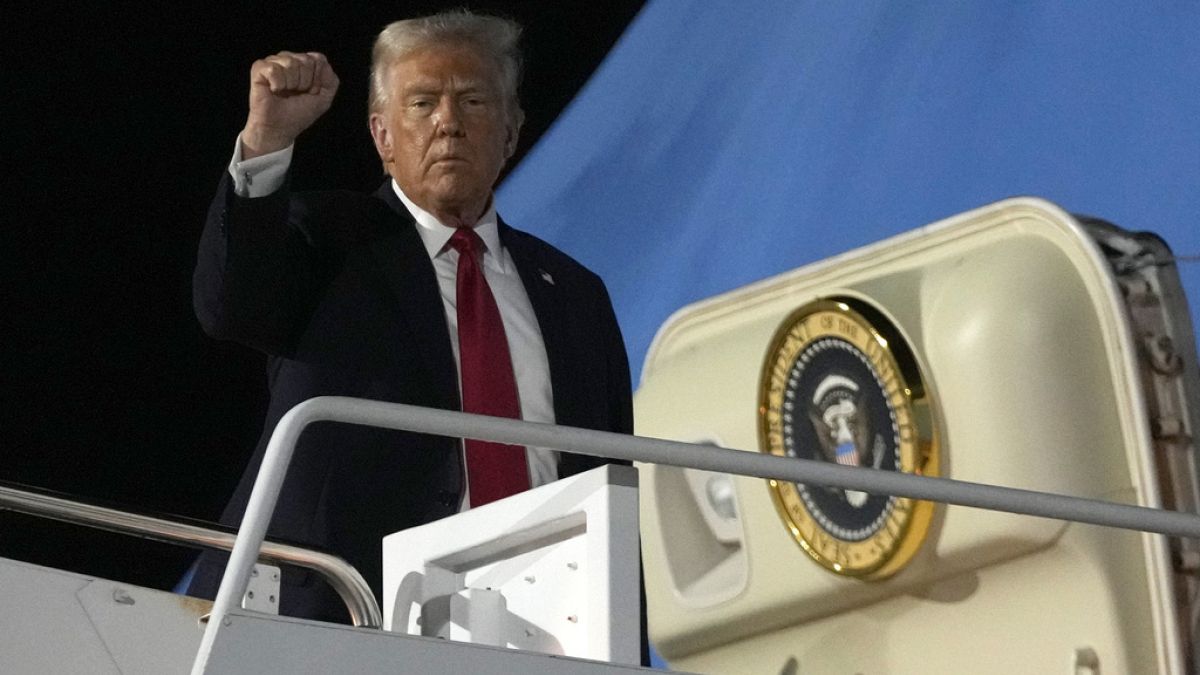EU will react against ‘unlawful’ US tariffs, says European Commission

The European executive has announced that it would retaliate against US tariffs on aluminium and steel if they are confirmed, considering them unlawful and counterproductive.
The EU will react to protect its interests against “unlawful and economically counterproductive” tariffs on aluminium and steel if these are confirmed, the Commission said in a statement on Monday.
“The EU sees no justification for the imposition of tariffs on its exports. We will react to protect the interests of European businesses, workers and consumers from unjustified measures,” the statement read.
“The imposition of tariffs would be unlawful and economically counterproductive, especially given the deeply integrated production chains the EU and US established through Transatlantic trade and investment,” it added.
The US president claimed on Sunday he would impose a 25% tariff on any steel and aluminium coming to the US without specifying whether European imports would be hit.
The Commission said it had not received any official notification and would not respond to announcements “without details and written clarification”.
Trump has already announced tariffs against Mexico, Canada and China, and has indicated that he will target the EU.
The EU claims trade between it and the US benefits both sides, with a goods surplus of €155.8 billion for Europeans and a services surplus of €104 billion for Americans.
During an interview with CNN on Sunday, French President Emmanuel Macron said that the US’ main adversary should be China and that Europe was an ally.
“Is the European Union your first problem? No, I don’t think so. Your first problem is China, so you should focus on the first problem,” Macron told the US cable channel, adding: “Europe is an ally for you. If you want Europe to be engaged on more investment, security, defence, if you want Europe to develop, which I think is in the interest of the US, you should not hurt European economies by threatening them with tariffs.”
Aluminium and steel were at the heart of a trade dispute between the EU and the US during Trump’s first term in office. At that time the US imposed 25% tariffs on European steel and 10% on aluminium citing “national security”. The EU retaliated by taxing Bourbon whiskey, Harley-Davidsons and a range of other products. Tariffs were temporarily lifted during the Biden administration, but only until March this year.
An EU official told Euronews that the Commission was informed by the US administration of President Donald Trump’s forthcoming statements on Sunday. The EU institution continues to hope that dialogue is possible. An EU spokesperson told journalists Monday that the EU remains “committed to constructive dialogue with the US,” adding “now is the time for collaboration, not confrontation.”
Commission’s president Ursula Von der Leyen will meet US vice-president J.D. Vance in Paris on Tuesday on the margin of an AI summit. The agenda of the meeting has not been revealed but EU/US trade relations will be to the fore.
Dealing with the possibility of tariffs
“We could do as we did the last time around and retaliate on specific goods in the US,” Varg Folkman, a policy analyst at the European Policy Centre (EPC), told Euronews.
“The EU could do as it did with steel back then and impose a safeguard action, which is a tariff wall in the EU in general that protects EU producers. That is still in place since we imposed it in 2019 and will run until 2026”, he added.
Free trade advocates, meanwhile, believe that the tariff ideas floated by Donald Trump are not conducive to growth.
“In the modern world, trade is interdependent and many products and varying components of products are manufactured in different countries,” Irish Prime Minister Micheál Martin told Euronews.
“As we learned during the COVID-19 experience, up to 50 countries were involved in different components of one vaccine, which illustrates the interdependence and complexity of supply chains,” he added.
Others stress that the measures would be counterproductive for the US, too: “The impact on the US is precisely the opposite of what Trump has promised, which is to lower inflation to improve the economy. And I think what Europeans need to keep in mind is that Trump is not immune to political gravity,” Brett Bruen, President of the Global Situation Room, told Euronews.
“He wants to have reciprocity. He wants to have parity with some of our trading partners, and particularly here in the European Union. The things that have bothered Americans are regulations as well as tariffs on things like technology and certain other American products which still face barriers here in the European market,” he added.
Finally, another possibility could be that Donald Trump plans to use the threat of tariffs in order to gain leverage, thus pushing EU Member states towards increasing their defence spending or reducing regulation of the technology sector.
Related
A New Book Argues That What Happens in Europe Doesn’t…
Remaking the World: European Distinctiveness and the Transformation of Politics, Culture, and the Economy by Jerrold Seigel “No issue in world
Poland plans military training for every adult male amid growing…
Poland’s prime minister, Donald Tusk, has said his government is working on a plan to prepare large-scale military training for every adult male in response t
2025 European Athletics Indoor Championships: Ditaji Kambundji secures women’s 60m…
Switzerland’s Ditaji Kambundji walked away from the 2025 European Athletics Indoor Championships in Apeldoorn on 7 March with much more than her first Europea
Takeaways from the EU’s landmark security summit after Trump said…
BRUSSELS (AP) — European Union leaders are trumpeting their endorsement of a plan to free up hundreds of billions of








